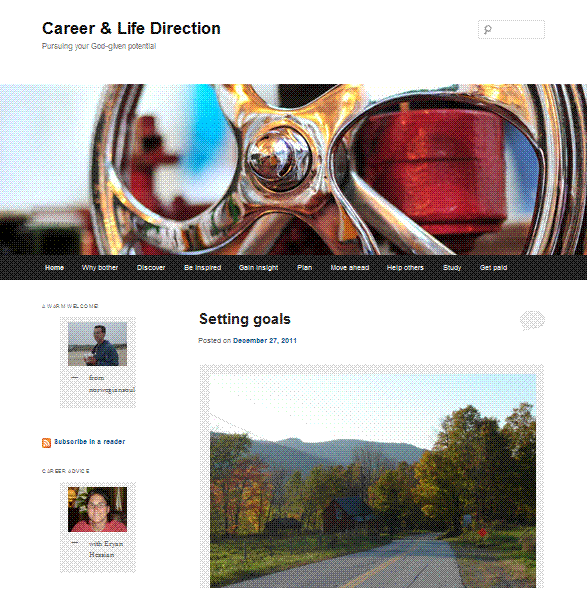Conversation, careers, and God
- At January 24, 2012
- By Nathan
- In Career Advice, Meeting Needs
 0
0
Over the years I have grown weary of all the God-talk, including my own. There’s often an emptiness and a lack of ringing reality about it all.
Depends who you are talking to and when; it isn’t always like that to be sure. But most of us are usually better at talking (or writing) than actually living. The living part – that is the hard part. But all the god-less talk isn’t much better either. Really, it isn’t. If you are like me, you have listened to enough secular sermons during the past 10 years or so to sink a ship. And a large one at that; about the size of the Costa Concordia. How this figure of speech got started, I have no idea. But you know what I mean. Day after day, god-less preachers pontificate habitually from some media and university pulpits. Wave after wave of endless chatter, produced by people who often appear to be warm and attractive and sophisticated and lively and completely oblivious to God.
Read More»Risk & Rivendell
- At February 19, 2011
- By Nathan
- In Career Planning
 0
0
Moving towards a new career involves taking risks, but the level of risk involved needs to be limited and measured. Make sure that you will be able to look back on your career preparation time with fondness rather than regret.
Planning on going to college or university? Be aware that investing in a long and expensive university education is no guarantee that you will get a secure and well-paying job in the end. In the classic manual for people in career transitions, What Colour is your Parachute, Richard Bolles mentions all the mournful letters he receives from unemployed university grads.
Signing up for a specific program of study is sometimes more of a benefit to the school than it is to the student. You have heard what the university graduate said to the college drop out, haven’t you? “Would you like fries with that, sir?”
As a result of the risk involved, and significant risk at that, it is necessary to carefully consider the formal education decisions that you make. Remember that student loans need to be repaid. Your carefree and subsidized college days will come to an end. What then? What skill will you have to offer to employers when you step out onto the street as it were, and begin to pound the pavement in search of a job.
Keep in mind that while marks and academic exploration matter a lot in college, production is more of a priority in the work place. What will you have to offer that would be of value to a company or a non-profit organization? A liberal arts education may be valuable in many ways, but it needs to be balanced with acquiring specific and tangible marketable skills.
If you see yourself as an academic, be certain that your education decisions will prepare you for a paying academic position. Getting paid matters.
Unless you have very deep pockets, I would not recommend investing more than two years in a formal program of study that will likely fail to translate into a sustainable career. Recently, I read about a new Christian-based liberal arts program called Rivendell Sanctuary. It is named after the elves’ sanctuary in J.R.R. Tolkien’s trilogy The Lord of the Rings and is located in Bloominton, Minnesota. I mention Rivendell here because their program is limited to 18 months for this very reason.
Try to balance intellectual exploration and development with acquiring practical skills. A college education should launch you out into a productive and satisfying life, and this includes getting a real job in the working world.
© Career & Life Direction 2011. All rights reserved.
Hoity-toity talk
- At February 16, 2011
- By Nathan
- In Career Planning
 0
0
Presenting yourself as God’s gift to humanity is not likely going to help your careers prospects. Claiming to be able to meet each and every need an organization has is a bit much. Confidence is one thing and cockiness is another.
Comparing yourself to Bill Gates and Steve Jobs may not be the best way to describe your computer skills. Familiarity with Microsoft Office is a basic skill that many employers look for. But very few people reading this are likely comfortable working with all the different part of this software program. Be specific. If you do not know how to operate Excel say so.
You may be tempted to hint that you have experience that you do not really have. Everybody wants to hire somebody with experience; someone who can hit the ground running as it were. And it can be very frustrating when you do not have experience and are trying to get some. “How can I get experience if nobody will hire me without experience?” you wonder.
As someone who has done a bit of hiring over the years, let me just say that faking it shows. Occasionally you may hear about a brilliant scam artist here or there who passed themself off as a pilot, a doctor, or a lawyer, and got away with it – for a time. Most mere mortals would not be advised to even attempt such shenanigans.
Tasks that appear to be simple and straightforward are often much more difficult. Have you ever tried jumped into a home renovation project only to discover that you may not live long enough to finish it? If exposed as a faker on the job your employer will lose confidence in you as person, and you will probably lose the job you just lied to get. It is a lose-lose situation.
Selling yourself is a legitimate and essential part of your quest for a career. But try not to engage in false advertising.



































